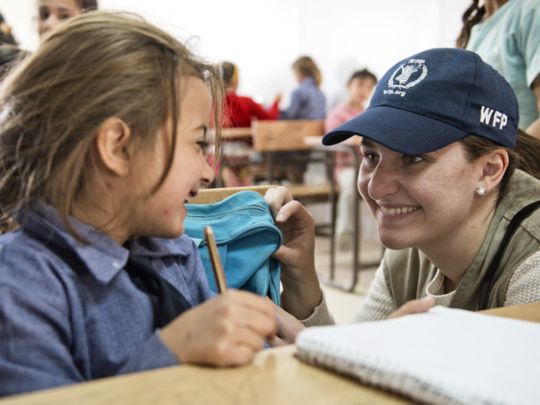
Last Ramadan, the regional arm of the World Food Programme (WFP) for the first time launched its Ramadan initiative, an online campaign with the tagline, Breaking fast is a joy many will not know.
Elise Bijon, Partnerships and Business Development Manager — Middle East and North Africa, Eastern Europe and Central Asia for United Nations World Food Programme, says, “Our online donations generated more than $50,000 (Dh183,650) across the region, beating internal expectations and resulted, once matched by the Rotary Club of Dubai, in more than $100,000.”
A new campaign
Bijon is set to repeat last year’s success with another campaign this year (wfp.org/Ramadan), with grant matching by the Rotary Clubs of the UAE, the coalition comprising Rotary Club of Jumeirah, Rotary Club of Dubai and Dubai Cosmopolitan Rotary Club.
The campaigns rely on technology along with the concept of sadqah or voluntary giving during Ramadan to raise money in support of the WFP School Meals programme in the Middle East — the equivalent of 400,000 children being fed for a day.
Dubai Cares, a UAE-based philanthropic organisation, has been effectively using technology to generate funds since its inception during Ramadan in 2007. “At points of sales in stores people can add a donation of Dh5, Dh10 or Dh100 to their bill to support primary education. We also have SMS donations with both Etisalat and Du, where people can donate between Dh30 to Dh500,” Noora M. Bin Kalban, Associate Community Engagement Manager, Dubai Cares tells GN Focus.
Making it easier to donate has made a world of difference to organisations. In a simple example of charity gone viral, an online donation site started by 25-year-old Canadian Max Siderov to collect $5000, in response to a video of an elderly bus monitor being reduced to tears by bullying school boys, generated $700,000 in a matter of days. The victim then set aside $100,000 for Karen Klein Anti Bullying Foundation this June.
Globally, payment major MasterCard has partnered with WFP in a campaign that aims to go beyond cash and beyond food. Called Digital Food, the partnership draws on MasterCard’s technical know-how, solutions and reach, even setting up prepaid cards in some cases.
Bijon says, “The regional implementation of the Digital Food pillar will help enhance WFP’s Food Voucher programme in the Middle East, which aims at providing food assistance through vouchers to food insecure communities in countries such as Iraq as well as to refugee families who fled the conflict in Syria into neighbouring countries.
“The regional implementation of the Integrated Giving pillar would involve leading banks, retailers and e-businesses,” Bijon says.
In Dubai, Adopt-a-Camp’s Saher Shaikh tells us that making the back end of her website stronger has resulted in 100 per cent more efficiency. “Now most processes, from registering as corporate teams to sponsoring a package can be done online,” she says.
While technology is an enabler, organisations say that it is equally important to forge ties. Noora Bin Kalban remembers the 2009 Thirst for Education campaign, which highlighted the importance of the children having clean drinking water to allow them to go to school. “People gathered and carried buckets of water in solidarity with children who walk long distances to get water, missing school days. It was a successful campaign,” she says, emphasising that since many beneficiaries of the Dubai Cares programmes are in developing countries, it is important to keep the UAE community informed and connected.
Ramadan sees individuals and organisations make an effort to reach out. This year, the Khalifa Bin Zayed Al Nahyan Foundation in Abu Dhabi is working with low-income Emirati families to create 1.7 million meals for charity during Ramadan for workers at labour camps and others in need. Adopt-a-Camp in Dubai is working with Dubai Chamber of Commerce with the aim of making at least 5,000 care packages, consisting of 40 items including a new mattress, a pillow, bed linen, toiletries for three months and energy food supplies for a month.
Donation boxes, POS contributions and corporate social responsibility programmes are in focus. The hospitality division of Saleh Bin Lahej Group, for instance, plans to launch its Care programme with two charities for children with special needs, dedicating one-day’s profits from all its restaurants across the UAE — Chili’s, Romano’s Macaroni Grill, El Chico, Cantina Laredo, Black Canyon and The Pizza Company. In addition, under its Dare to Give initiative guests can dare any of restaurant staff to do funny things to raise funds for charity.
Charity works towards creating links where none exist. Shaikh says, “Men say that the kindness they experienced that day changed their lives. They said that a peaceful sleep was the best gift we’d given them and the knowledge that there are people who care. Workers feel they are ignored and people are not comfortable being around them. These care packages make them feel included again.”











